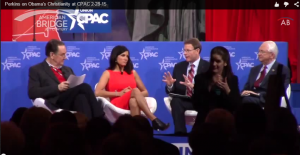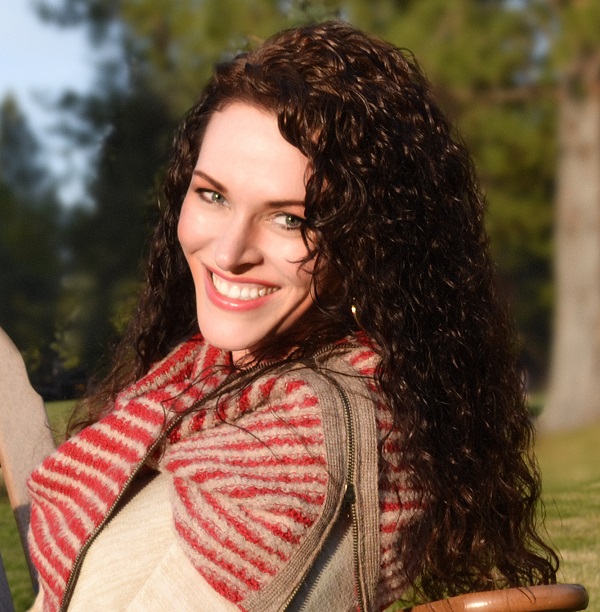A panel discussion this past weekend at the Conservative Political Action Conference (CPAC) offered a stark assessment of the state of religious freedom in the U.S., providing a rallying cry for conservatives as the race for the 2016 Republican Presidential nomination begins.
Entitled “Would the Pilgrims Still be Welcome Here?” the panel tackled topics ranging from the assault on religious values levied by teaching evolution in the classroom, to persecution as a “badge of honor” for American Christians. Moderated by columnist Cal Thomas, the conversation included radio host Dana Loesch, Republican Representative Randy Neugebauer of Texas, and President of the American Research Council, Tony Perkins.
 While the entirety of the panel warrants further discussion, Perkins in particular caught my attention.
While the entirety of the panel warrants further discussion, Perkins in particular caught my attention.
Responding to a question wondering if too much attention is placed on political “sound bites” regarding the faith of Presidential candidates, Perkins said: “This President proclaims to be a Christian but his practice is anything but when you look at his policies. He is dismissive of Christianity and deferential to Islam.” Perkins did not elaborate further, though his comments at CPAC echo similar observations he made on his radio program, “Washington Watch” in September 2014. Responding to a caller, Perkins remarked, “I would say that [the President] is extremely sympathetic to the Muslim world and overly sympathetic I would say.”
I am perplexed by Perkins’ assertion that the President somehow shows preferential treatment to Islam at the expense of Christianity. Perhaps Perkins is calling out the President for his refusal to link terrorists in the Middle East with the Islamic faith they profess. Or maybe, Perkins interpreted the President’s comments at the National Prayer Breakfast, where he reminded the audience how “during the Crusades and the Inquisition, people committed terrible deeds in the name of Christ” as dismissive of Christianity.
At best, Perkins’ comments are abrasive and unfounded. As the Commander in Chief of a religiously diverse nation, the President must show respect toward the various belief systems which comprise the United States. To show deference to Islam in no way suggests the President dismisses Christianity. In light of the recent murder of three young Muslim Americans in North Carolina, Perkins’ disdain for the President’s “deference” toward Islam, only increases religious tension, placing Muslims and Christian in competition for the President’s loyalty. In the midst of a panel focusing on defending religious liberty, Perkins manages to underhandedly attack Islam. Irony abounds.
Directly before lambasting the President, Perkins remarked, “For us as voters, the profession of faith is one thing, but the practice of the faith is the real thing.” In what was otherwise a panel full of hyperbole and partisan attacks, finally a comment I wholeheartedly endorse.
Yet unlike Perkins, as I look at some of the policies enacted by the President and his administration, I cannot help but see the fruit of his Christian faith at work.
In expanding health care access to millions of Americans, increasing economic and educational opportunities for veterans, supporting equal pay for equal work, and paid sick leave—the President is embodying the Gospel mandate to care for the least of these and stand with the marginalized.
By embracing marriage equality, supporting an increased minimum wage, and working for a more humane immigration system the President’s policies affirm how each person is created in the image of God and are thus deserving of dignity and opportunity.
Yes, there is more work to be done and the President’s policies are not perfect. Yet by leveling such criticism against the President without providing evidence, Perkins does nothing to advance political discourse in our fractured society. Instead, his words only further divide our electorate, stirring the pot in what will likely be a contentious Presidential election cycle.
There is a desperate need in our country for a robust and respectful dialogue regarding religious values, freedom, and liberty. As our country’s religious landscape rapidly changes, it is perfectly natural for some to wonder how these societal shifts will affect their own religious identity and practice. But a panel rife with baseless and partisan attacks against our President and others on the left is not the appropriate venue for such an important conversation.
Kyle Cristofalo received his Master of Divinity from Emory University where he concentrated in Justice, Peacebuilding, and Conflict Transformation. Kyle most recently served as a fellow at the Presbyterian Church (U.S.A.) Office of Public Witness in Washington, DC. working primarily on issues relating to Israel/Palestine, as well as immigration.











